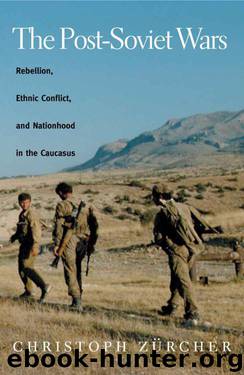The Post-Soviet Wars by Zurcher Christoph

Author:Zurcher, Christoph [Zurcher, Christoph]
Language: eng
Format: epub
Publisher: NYU Press short
Published: 2009-08-31T20:00:00+00:00
After the Wars
Soviet ethnofederalism no longer exercises its destructive energy, but it has left open wounds. After a decade of stalled negotiations, a solution to the Ossetian and Abkhazian conflicts is still not yet in sight. In September 2003, Abkhazia celebrated the tenth anniversary of the victory in its “war of independence”—a “victory” that came at the price of heavy political and economic dependence on Russia and international isolation. Most Abkhazians have applied for Russian citizenship, which is widely perceived as a viable gateway to some social and political security. Violence erupts periodically, and dozens of Russian peacekeeping troops, Abkhazian officials, and civilians from the different national communities have been killed since the end of war. At present, Moscow controls the situation in Abkhazia through its military presence and its economic and political support—none of which can be matched by Georgia.
The situation in South Ossetia seems more fluid. Like Abkhazia, this tiny quasi-state has become a hub for informal trade, mainly in alcohol and tobacco. Its political elite is centered around one or two powerful political clans that exploit what is a quasi-private free economic zone. In contrast to the situation in Abkhazia, Georgia and South Ossetia did take practical steps to mend their relationship after 1992. Nonetheless, a final settlement to the conflict remains out of reach. In May 2004, Georgia closed the huge and famous Ergneti Market in South Ossetia, where all sorts of goods were traded, most of them smuggled from Russia. Some analysts estimate that the Ergneti Market, essentially an illicit free economic zone, had yielded as much as US $35 million annually, a substantial portion of which ended up in the hands of the South Ossetian political elite.34
In short, both South Ossetia and Abkhazia remain unresolved conflicts. A solution still seems distant, given that Georgia has little to offer to the breakaway entities politically or economically and is too weak militarily to alter the situation by force. Furthermore, Russia has an interest in maintaining the status quo and in keeping its position as the veto player in the region.
Download
This site does not store any files on its server. We only index and link to content provided by other sites. Please contact the content providers to delete copyright contents if any and email us, we'll remove relevant links or contents immediately.
| Anthropology | Archaeology |
| Philosophy | Politics & Government |
| Social Sciences | Sociology |
| Women's Studies |
The Secret History by Donna Tartt(19088)
The Social Justice Warrior Handbook by Lisa De Pasquale(12190)
Thirteen Reasons Why by Jay Asher(8910)
This Is How You Lose Her by Junot Diaz(6887)
Weapons of Math Destruction by Cathy O'Neil(6280)
Zero to One by Peter Thiel(5802)
Beartown by Fredrik Backman(5754)
The Myth of the Strong Leader by Archie Brown(5507)
The Fire Next Time by James Baldwin(5446)
How Democracies Die by Steven Levitsky & Daniel Ziblatt(5219)
Promise Me, Dad by Joe Biden(5153)
Stone's Rules by Roger Stone(5088)
A Higher Loyalty: Truth, Lies, and Leadership by James Comey(4964)
100 Deadly Skills by Clint Emerson(4925)
Rise and Kill First by Ronen Bergman(4789)
Secrecy World by Jake Bernstein(4753)
The David Icke Guide to the Global Conspiracy (and how to end it) by David Icke(4720)
The Farm by Tom Rob Smith(4512)
The Doomsday Machine by Daniel Ellsberg(4490)
